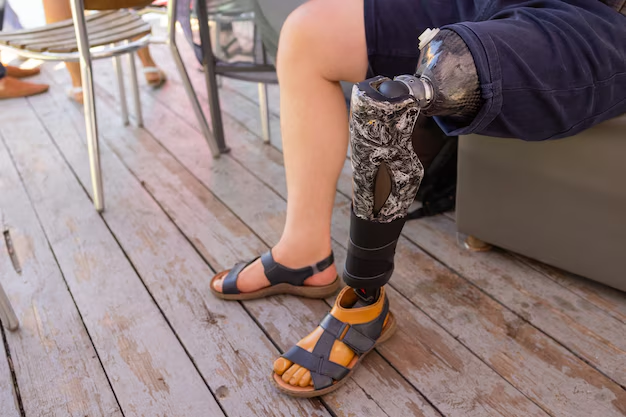Your Guide to Does Medicare Pay For Orthotics
What You Get:
Free Guide
Free, helpful information about Medicare FAQ and related Does Medicare Pay For Orthotics topics.
Helpful Information
Get clear and easy-to-understand details about Does Medicare Pay For Orthotics topics and resources.
Personalized Offers
Answer a few optional questions to receive offers or information related to Medicare FAQ. The survey is optional and not required to access your free guide.
Does Medicare Cover Orthotics? Here’s What You Need to Know
When it comes to managing health and mobility, orthotics can play a crucial role in enhancing comfort and functionality. Many individuals reliant on Medicare find themselves asking: "Does Medicare pay for orthotics?" The answer is not just a simple yes or no, but rather a nuanced explanation needs to unravel this query.
Medicare and Orthotics: Understanding the Coverage
Medicare, a federal health insurance program primarily for people aged 65 and older, does provide coverage for orthotics under certain conditions. This coverage usually falls under Part B (Medical Insurance), which addresses outpatient care, preventive services, and durable medical equipment (DME), including some orthotics prescribed by a healthcare provider.
What Qualifies Under Medicare?
- Reasonable and Necessary: For Medicare to cover orthotics, they must be deemed medically necessary by a doctor treating an ailment specific to your feet, ankles, or legs.
- Medicare-Approved Supplier: Beneficiaries must ensure the orthotics are supplied by a Medicare-enrolled provider.
- Specific Health Conditions: Coverage is typically limited to patients with diabetes, certain foot injuries, or other qualifying conditions.
The Financial Aspect: What You Might Pay
While Medicare can aid with costs, beneficiaries might still be responsible for some out-of-pocket expenses. Typically, this includes the 20% coinsurance, and the Part B deductible applies. It's advisable to review specific plan details or discuss options with a healthcare or insurance professional to understand potential costs fully.
Exploring Financial Assistance and Support Programs
If you find that Medicare does not fully cover your orthotics or you're still facing financial challenges, rest assured there are other avenues to explore:
Government Aid Programs
- Medicaid: Jointly funded by the federal and state governments, Medicaid can sometimes cover costs where Medicare doesn't, particularly for those with low income.
Financial Assistance Options
- Charitable Organizations: Organizations such as Easterseals and the United Way often provide support for those needing orthotic devices.
- Nonprofit Assistance: Look for community-based nonprofits dedicated to assisting individuals with medical supplies.
Education and Grants
- Educational Grants: For those studying in medical or related fields, specific grants and scholarships might help alleviate other costs, freeing up personal finances for essential medical needs.
Debt Relief and Credit Solutions
- Zero-Interest Credit Plans: Some suppliers offer payment plans to spread out costs without accumulating interest.
- Medical Expense Loans: Specialized loans can cover unforeseen medical expenses at a lower interest rate than regular credit.
Tailored Solutions for Your Needs
Navigating the intricate landscape of both Medicare and additional support systems requires knowledge and perseverance. It’s essential to stay informed about your options and seek assistance if needed. Whether through government programs or nonprofit assistance, a range of solutions exist to ensure you get the orthotics you need without compromising on essential health care.
🗂️ Quick Reference: Financial Assistance and Support Programs
- 📑 Medicaid: State-specific support aiding with broader medical expenses.
- 🤝 Charitable Organizations: Community or nationally based like Easterseals for direct aid.
- 🎓 Educational Grants: Reduces personal expenditures, freeing resources for health needs.
- 💳 Zero-Interest Credit Plans: Payment spread without accumulating debt.
- 💰 Medical Expense Loans: Tailored loans for managing health-related finances.
Making informed decisions about your health can feel overwhelming, but there are many tools at your disposal. Understanding Medicare's stance and knowing where to find additional aid can bring peace of mind. Whether you need orthotics today or are planning for future needs, staying informed is your strongest asset.
What You Get:
Free Medicare FAQ Guide
Free, helpful information about Does Medicare Pay For Orthotics and related resources.

Helpful Information
Get clear, easy-to-understand details about Does Medicare Pay For Orthotics topics.

Optional Personalized Offers
Answer a few optional questions to see offers or information related to Medicare FAQ. Participation is not required to get your free guide.


Discover More
- a Medical Provider That Accepts Medicare Assignment Must
- a Medical Provider That Accepts Medicare Assignment Must Quizlet
- a Medicare Patient Received Treatment That Isn't Covered By Medicare
- a Medicare Patient Receives Treatment That Isn't Covered By Medicare
- a Medicare Supplement Basic Benefit Is Quizlet
- a Medicare Supplement Companies
- a Medicare Supplement Policy Is Quizlet
- a Medicare Supplement Policy Must Not Contain Benefits Which
- a Patient Received Treatment In August Medicare
- Am I Eligible For Medicare
